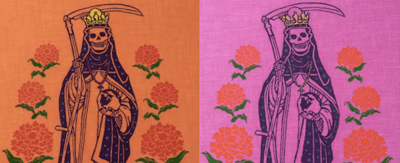Photo by Matt Schonfeld, Styled by Terrell Villiers, Wardrobe by Luar
A Horse With One Name: Cleo Reed’s Black Folk Revolution
On their personal and penetrating new album, Cleo Reed explores the modern resonance of a hardwired emblem of pure, precious Americana
Three-ish centuries into America’s troubled run, and the country has yet to outpace the horse. Fast and formidable, strong and symbolic of an unvarnished, majestic spirit, the horse has left lasting footprints throughout the country’s history. From the earliest records of indigenous peoples to the cowboys who came to conquest under false pretense to the Hollywood Hills and to the halls of Rock & Roll music, the horse is an embedded and inextricable icon of pure, precious Americana. But a recently renewed interest in, and excavation of, the history of African American cattle culture has brought it back to pop culture prominence—via Beyonce’s Renaissance and COWBOY CARTER covers and album campaigns—only with revitalized scrutiny, as we face and reckon with the fact that this history, though overshadowed, has always been integral to the identity of this very land and the souls of Black folk. And Cleo Reed is here to unpack it all.
“I’m taking back Folk as an ideological term as opposed to just a genre focus,” says Reed, the creator and architect of the new album, CUNTRY. Producer, arranger, and singer-songwriter are a few descriptors that span the skill and sonic design showcased on the Brooklyn-based artist’s heavy and referential sophomore outing. The work itself is refreshing and timeless, a tapestry of musical touchstones at an operatic pace of 14 tracks/mph. It is monumental in its intellectual honesty and a welcome etch in the stone pantheon of great chameleon-like craftsmen that came before, like Sweet Honey In The Rock, Lauryn Hill, Joan Armatrading, and Cody Chesnutt. Opening tunes like “Salt n’ Lime” and “Women at War” are poised to be modern classics of the traveling blues, capitalizing on itches still left to be scratched in the wake of Frank Ocean’s Endless. “I can’t be the solution,” Reed croons on the anthemic “Americana” with the repetition of a humble prayer. The position is pertinent and penetrating, and the album does due diligence in course correcting our clarity with its composition.

Photo by Matt Schonfeld
Deeply personal, yet communal, CUNTRY is flanked by choral voices (“Tally The Bill”) and musical contributions of an extended tribe, with appearances from Elliot Skinner, billy woods, and Kyle Kidd, to name a few. The album offers a record of the effort, tallies the questions, and philosophizes the answers before us. “I noticed people aren’t resonating with being on top of the horse and struggling. They feel like a working mule. They feel like…a work-horse,” Reed explains. Hardwired American pastimes like the Kentucky Derby—where thoroughbreds race, to the death in some cases, at the stake of a dollar, while a jockey sits assured and insured above their labor and in their spotlight—outline this seemingly ancient relationship, revealing a country consumed by capital and competition, obsessed with gambling and sport (acutely explored on “Baseball” and “Strike!”). The Derby also offers a glimpse at the split—intellectual property and strategic credit bestowed to the jockey, homespun theories of natural, raw ability, and a divine justification of servitude for their workforce.
In the words of Yasiin Bey, “it’s mathematics and we revolve around science.” For Reed, it’s as simple as that. “I have to be a working artist and sustain, so I have to think about money. This music is in alignment with where we’re at in society because people are speaking in the language of economics. They are limited to that language, and so I took the limitations of that language…and tried to do that lyrically and musically.”
I/we/you are “always the horse and never the jockey,” Reed proclaims as self-evident. “No one is coming to save us.”
“Will I win the race?” and “Can you blame me for existing?” are questions posed on the album almost as pleas to a higher power. Yet they evolve into essential and immediate inquiries aimed at the listener, holding the reins of CUNTRY while asking its audience to pry deeper into the recesses of a national psychology crestfallen by a bastardized history met with everyday bravery—a history and global ranking built on the backs of our collective, often exploitative, undocumented, and underage labor.
And it beckons listeners to consider the consequences of promises perennially broken by an empire in decline. To be so intrinsically enmeshed in the fabric of this country is to constantly exist outside of its presented binaries—between riches and debt, Capitalist and Anti-Capitalist—and acknowledge the fallacy of its “dream.”
It demands a different kind of cavalry and a herd unto its own: a horse with one name.
You might also like 























